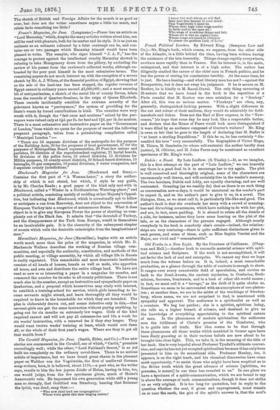French Political Leaders. By Edward King. (Sampson Low and Co.)—Mr.
King's book, which comes, we suppose, from the other side of the Atlantic, is a little behind the time, having been written during the existence of the late Assembly. Things change rapidly everywhere, nowhere more rapidly than in France. But its interest is, in the main, unimpaired, and that interest is of a high order. The author has diligently studied the career of the chief men in French politics, and he has the power of stating his conclusions forcibly. At the same time, he is just. He has a leaning—and what literary man has not ?—against the Bonapartists, but it does not sway his judgment. If he is severe on M. Ronher, he is kindly to M. Raoul-Duval. The only thing savouring of ill-nature that we have found in the book is the repetition of a Paris scandal that M. Rouher was once mistaken for a "flunkey." After all, this was no serious matter. "Flunkeys" are often, nay, generally, distinguished-looking persons. With a slight difference in the cut and colour of their uniform, they would do admirably for field- marshals and dukes. Does not the Earl of Kew express, in the "New- comes," his hope that some day he may look like a respectable butler, and declare that the House of Peers would look more distinguished if it were filled by an audience composed of Gunter's waiters ? Mr. King is even so fair that he goes to the length of declaring that M. Buffet is "at heart a sterling Republican." If this be so, he has certainly "dis- sembled his love" very successfully. The biographies of Victor Hugo, M. Thiers, M. Gambetta (to whose self-restraint the author hardly does justice), M. 011ivier, and M. Jules Favre may be mentioned as excellent specimens of Mr. King's work.






























 Previous page
Previous page